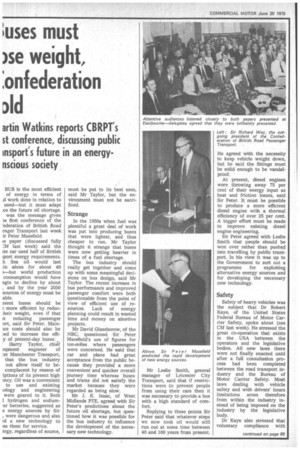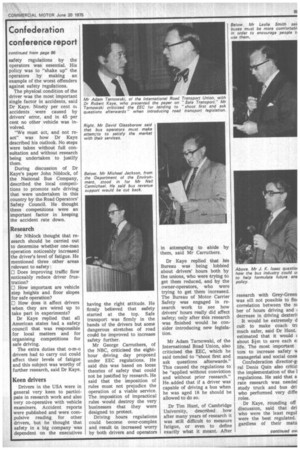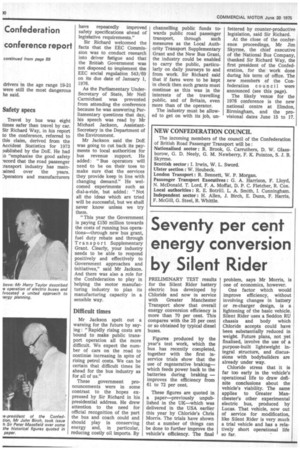uses must me weight, :onfederation Did
Page 88

Page 91

Page 92

If you've noticed an error in this article please click here to report it so we can fix it.
BUS is the most efficient of energy in terms of .r1 work done in relation to used—but it must adapt :ce the future oil shortage. was the message given ie first conference of the 'ederation of British Road enger Transport last week ir Peter Masefield.
Le paper (discussed fully last week) said the ite car used half of British ;port energy requirements. h Sea oil would last in alone for about 40 —but world production consumption would have egin to decline by about and by the year 2050 sources of energy must be able.
a sent buses should be more efficient by reductheir weight, even if that it reducing passenger ort, said Sir Peter. Mainice costs should also be 3ed to increase the effiy of present-day buses. _ Harry Taylor, chief Lopment engineer of :er Manchester Transport, that the bus industry not allow itself to becomplacent by reason of iptions of its present high mcy. Oil was a convenient to use and existing lology and engineering were geared to it. Both hydrogen and sodiumur batteries, suggested as e energy sources by Sir , were dangerous and also a new technology to !ss them for service.
ergy, regardless of source, must be put to its best uses, said Mr Taylor, but the environment must not be sacrificed.
Strange
In the 1950s when fuel was plentiful a great deal of work was put into producing buses that were lighter, and thus cheaper to run. Mr Taylor thought it strange that buses were now getting heavier in times of a fuel shortage.
The bus industry should really get together and come up with some meaningful decisions on bus design, said Mr Taylor. The recent increase in bus performance and improved passenger comfort were both questionable from the point of view of efficient use of resources. Lack of energy planning could result in wasted time and money on abortive projects.
Mr David Glassborow, of the NBC, questioned Sir Peter Masefield's use of figures for ton-miles where passengers were concerned. He said that car and plane had great acceptance from the public because they provided a more convenient and quicker overall journey time whereas buses and trains did not satisfy the market because they were regarded as being slow.
Mr J. K. Isaac, of West Midlands PTE, agreed with Sir Peter's predictions about the future oil 'shortage, but questioned how it was possible for the bus industry to influence the development of the necessary new technology. Mr Leslie Smith, general manager of Leicester City Transport, said that if restrictions were to prevent people from using their cars then it was necessary to provide a bus with a high standard of comfort.
Replying to these points Sir Peter said that whatever steps we now took ail would still run out at some time between 40 and 100 years from present.
Left : Sir Richard Way, the outgoing president of the Confederation of British Road Passenger Transport.
He agreed with the necessity to keep vehicle weight down, but he said the fittings must be solid enough to be vandalproof.
At present, diesel engines were throwing away 75 per cent of their energy input as heat and friction losses, said Sir Peter. It must •be possible to produce a more efficient diesel engine with a thermal efficiency of over 25 per cent. A bigger effort must be made to improve existing diesel engine engineering.
Sir Peter agreed with Leslie Smith that people should be won over rather than pushed into travelling by public transport. In his view it was up to the Government to sort out a programme for exploiting alternative energy sources and for developing the necessary new technology.
Safety
Safety of heavy vehicles was the subject that Dr Robert Kaye, of the United States Federal Bureau of Motor Carrier Safety, spoke about (see CM last week). He stressed the great co-operation that exists in the USA between the operators and the legislative bodies. All new laws there were not finally enacted until after •a full consultation process had been completed between the road transport industry and the Bureau of Motor Carrier Safety. Most laws dealing with vehicle safety and with drivers' hours limitations arose therefore from within the industry instead of being imposed on the industry by the legislative body.
Dr Kaye also stressed that voluntary compliance with safety regulations by the operators was essential. His policy was to "shake up" the operators by making an example of the worst offenders against safety regulations.
The physical condition of the driver was the most important single factor in accidents, said Dr Kaye. Ninety per cent oi accidents were caused by drivers' error, and in 45 per cent no other vehicle was involved.
"We must act, and not react" was how Dr Kaye described his outlook. No steps were taken without full consultation and without research being undertaken to justify them.
During discussion of Dr Kaye's paper John Niblock, of the National Bus Company, described the local competitions to promote safe driving that were undertaken in this country by the Road Operators' Safety Council. He thought these competitions were an important factor in keeping the accident rate down.
Research
Mr Niblock thought that research should be carried out to determine whether one-man operation noticeably increased the driver's level of fatigue. He mentioned three other areas relevant to safety : 0 Does improving traffic flow noticeably reduce driver frustration?
How important are vehicle step heights and floor slopes for safe operation?
LT How does it affect drivers when they are wired up to take part in experiments?
Dr Kaye replied that all American states had a safety council that was responsible for local matters and for organising competitions for safe driving.
The extra duties that o-m-o drivers had to carry out could affect their levels of fatigue and this subject was worthy of further research, said Dr Kaye.
Keen drivers
Drivers in the USA were in general very keen to participate in research work and also very co-operative with vehicle examiners. Accident reports were published and were compulsive reading for other drivers, but he thought that safety in a big company was dependent on the executives having the right attitude. He firmly believed that safety started at the top. Safe transport was firmly in the hands of the drivers but some dangerous stretches of road could be improved to increase safety further.
Mr George Carruthers, of the NBC, criticised the eighthour driving day proposed under EEC regulations. He said this was based on loose theories of safety that could not be justified by research. He said that the imposition of rules must not prejudice the operation of a viable service. The imposition of impractical rules would destroy the very businesses that they were designed to protect.
Driving hours regulations could become over-complex and result in increased worry by both drivers and operators Dr Kaye replied that his Bureau was being lobbied about drivers' hours both by the unions, who were trying to get them reduced, and by the owner-operators, who were trying to get them increased. The Bureau of Motor Carrier Safety was engaged in research work to see how drivers' 'hours really did affect safety; only after this research was finished would he consider introducing new legislation.
Mr Adam Tarnowski, of the International Road Union, also criticised the EEC, which he said tended to "shoot first and ask questions afterwards." This caused the regulations to he "applied without conviction and without prior research." He added that if a driver was capable of driving a bus when he was aged 18 he should be allowed to do so.
Dr Tim Hunt, of Cambridge University, described how after many years of research it was still difficult to measure fatigue, or even to define exactly what it meant. After research with Grey-Green was sill not possible to fin' correlation between the ni ber of hours driving and ; decrease in driving dexteril It would be extremely d cult to make coach trz much safer, said Dr Hunt. estimated that it would ( about $itn to save each e: life. The most important tors to increase safety vk managerial and social ones Confederation director-g' ral Denis Quin also critic the implementation of the regulations. He said that s, rate research was needed study truck and bus dri• who performed very diffe roles.
Dr Kaye, rounding off discussion, said that dri who were the least regul were the best regulated. gardless of their matu Travel by bus was eight Limes safer than travel by car. Sir Richard Way, in his report to the conference, referred to this claim, derived from the Accident Statistics for 1973 published by the DoE. He had :o "emphasise the good safety -ecord that the road passenger :ransport industry has mainLained over the years. Dperators and manufacturers have repeatedly improved safety specifications ahead of legislative requirements," Sir Richard welcomed the facts that the EEC Commission was to conduct research into driver fatigue and that the British Government was not disposed to implement the EEC social regulation 543/69 on its due date of January 1, 1976.
As the Parliamentary UnderSecretary of State, Mr Neil Carmidhael was prevented from attending the conference because he was answering Parliamentary questions that day, his speech was read by MT Michael Jackson, AssistantSecretary in the Department of the Environment.
Mr Jackson said the DoE was going to cut back its payments to local authorities for bus revenue support. He added: "Bus operators will need to be on their toes to make sure that the services they provide keep in line with changing demand." He welcomed experiments such as dial-'a-ride, but added: "Not all the ideas which are tried will be successful, but we shall never know unless we try them.
"This year the Government is paying £150 million towards the costs of running bus opera tions—through new bus grant, fuel duty rebate and through Transport Supplementary Grant. Clearly, your industry needs to be able to respond positively and effectively to Government approaches and initiatives," said Mr Jackson. And there was also a role for the Confederation to play in helping the motor manufacturing industry to plan its manufacturing capacity in a sensible way.
Difficult times
Mr Jackson spelt out a warning for the future by say ing: "Rapidly rising costs are bound to make public trans port operation all the more difficult. We expect the number of cars on the road to continue increasing in spite of rising petrol costs. We can be certain that difficult times lie ahead for the bus industry as for all of us."
These government pronouncements were in some contrast to the hopes expressed by Sir Richard in his presidential address. He drew attention to the need for official recognition of the part the bus and coach could and should play in conserving energy and, in particular, reducing costly oil imports. By channelling public funds towards public road passenger transport, through such measures as the Local Authority Transport Supplementary Grant and the New Bus Grant, the industry could be enabled to carry the public, particularly on daily journeys to and from work. Sir Richard said that if fares were to be kept in check then such grants must continue as this was in the interests of the travelling public, and of Britain, even more than of the operator, The industry must be allowed to get on with its job, un fettered by counter-productive legislation, said Sir Richard.
At the close of the conference proceedings, Mr Jim Skyrme, the chief executive of the National Bus Company, thanked Sir Richard Way, the first president of the Confederation, for the work done during his term of office. The new members of the Confederation council were announced (see this page).
The likely venue for the 1976 conference is the new national centre at Elmdon, Birmingham, and the provisional dates June 15 to 17.




























































































































































